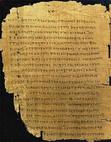 I recently taught a five part series on textual criticism based on the works of Dean John Burgon and comparing the KJV with the ESV. In my opinion, Burgon represents the best arguments against the modern critical text, and the ESV represents the best translation of that text into English. Granted, Burgon's work is a bit dated, but many of his arguments are just as relevant today as they were when he first presented them more than 100 years ago. This is apparent by the accuracy of Burgon's arguments when compared with the ESV and the most recent editions of the critical text. So, without any further ado, here is the outline from part 1 of my series on textual criticism. I. Foundational Concepts
A. Textual Criticism Defined - "The process of attempting to ascertain the original wording of a text." - "The method used to determine what the original manuscripts of the Bible said." B. Divine Inspiration - Every word of Scripture was authored by God Himself – II Tim. 3:16, II Peter 1:21. - Since God is incapable of error, this means that there is no error in Scripture – I John 1:5, Psalm 145:17, John 10:35. C. Providential Preservation - God promised to preserve His word – Psalm 12:6-7, Mark 13:31. II. Four Methods of New Testament Preservation A. Manuscript Copies - More than 5,000 available today. B. Ancient New Testament Versions - Translations of the Greek text into other languages such as Latin or Syriac. C. Quotations from church fathers - More than 86,000 have been collected. D. Ancient Lectionaries - Collections of verses designed to be read on various holy days. III. Two Methods of Textual Criticism A. The Consistently Christian Method - Assumes Divine Inspiration - Any text which contains an error cannot be a true copy of the Word of God. - Assumes Providential Preservation - The true Word of God always has been and is even now available to the Church. B. The Naturalistic Method - Denies Inspiration - The Bible is either wholly the work of man, or it is a work of man which God then appropriated for His use. - Denies Preservation - We will never be able to recover exactly what was written in the original manuscripts of the Bible. - Assumes Ancient Reliability - The most ancient manuscripts are the most accurate renditions of the original. IV. Two Greek Texts A. The Critical Text - Based primarily on four manuscripts: B (Vaticanus), Aleph (Sinaiticus), C, and D (Bezae). - These manuscripts disagree with each other in thousands of places. - To create this text, critics chose which of these manuscripts to accept as correct at each point of disagreement, thus creating a conglomerate of the four. - This text is sometimes referred to as the eclectic text as a result of this process. B. The Textus Receptus - Based primarily on the reading found in the majority of manuscripts. - More than 95% of known manuscripts are in agreement with this text. - Supported by the majority of copies of the ancient versions. - Supported by the vast majority of the quotes from the church fathers. - Supported by the vast majority of the readings found in ancient lectionaries. V. A Comparison of the Two Methods (I Timothy 3:16) KJV - "And without controversy great is the mystery of godliness: God was manifest in the flesh, justified in the Spirit, seen of angels, preached unto the Gentiles, believed on in the world, received up into glory." ESV - "Great indeed, we confess, is the mystery of godliness: He was manifested in the flesh, vindicated by the Spirit, seen by angels, proclaimed among the nations, believed on in the world, taken up in glory." A. Evidence for the KJV Reading (God or Theos) - Found in 289 Greek manuscripts and lectionaries. - Supported by 3 ancient versions. - Quoted by 20 church fathers. B. Evidence for the ESV Reading (He or Hos) - Found in 7 Greek manuscripts and lectionaries. - Supported by 6 ancient versions. - Quoted by 0 church fathers. - The manuscripts which do contain this reading are some of the oldest available. C. The balance of evidence lies heavily in favor of the KJV reading. This concludes part 1 of this series. Parts 2 through 5 will consist almost entirely of comparisons between the evidence for various passages in the critical text and the evidence for the same passages in the Textus Receptus.
0 Comments
Your comment will be posted after it is approved.
Leave a Reply. |
Bill Fortenberry is a Christian philosopher and historian in Birmingham, AL. Bill's work has been cited in several legal journals, and he has appeared as a guest on shows including The Dr. Gina Show, The Michael Hart Show, and Real Science Radio.
Contact Us if you would like to schedule Bill to speak to your church, group, or club. "Give instruction to a wise man, and he will be yet wiser: teach a just man, and he will increase in learning." (Proverbs 9:9)
Search
Topics
All
Archives
June 2024
|


 RSS Feed
RSS Feed